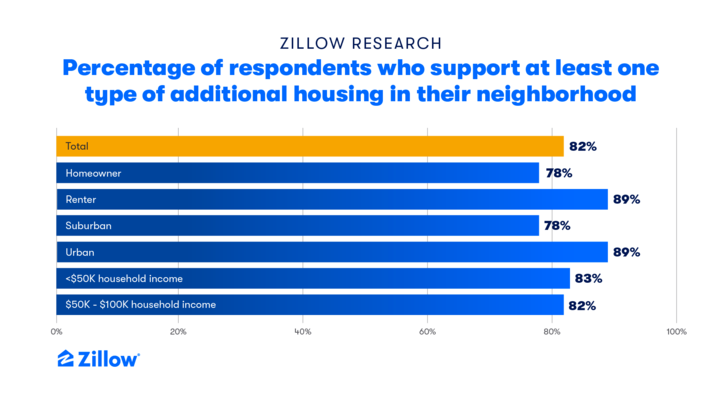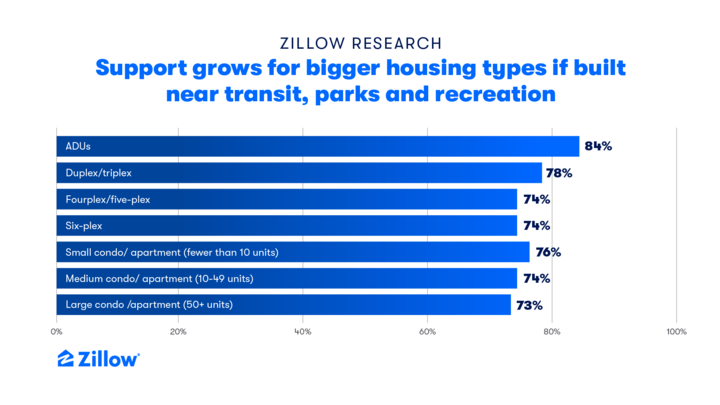According to a new report from Zillow, research finds a growing majority of adults support adding more homes to their neighborhoods in response to the housing affordability crisis. Record-low inventory—triggered by a lost decade of home construction that caused a shortfall of 1.35 million new homes, fierce competition spurred by historically low interest rates, and now inflation—has made it harder for Americans nationwide to buy or rent a home.
Monthly mortgage costs have nearly doubled during the pandemic, making homeownership much more expensive for potential homebuyers. This housing crunch also extends to renters, with the typical rent price nationwide reaching more than $2,000 a month—25% more than what they would have expected to pay in the months before the pandemic.
Zillow's latest analysis has found increased public support for more density as a way to improve affordability. Support is strongest for new accessory dwelling units (ADUs), duplexes or triplexes in residential neighborhoods. Some 69% of respondents also said allowing small and medium apartment buildings would have a positive impact on the availability of more affordable housing options, but they split more evenly on apartment buildings in their own backyards.

Across all the surveyed metros, 57% agreed they would support a multifamily residence like an apartment building being built in their neighborhood, while 36% disagreed. Small, medium, and large apartment buildings received majority of support if they were built near transit and recreation amenities.
"More and more people understand that the key to stopping runaway housing costs is to build more homes," said Manny Garcia, Senior Population Scientist at Zillow. "There is majority support among renters and homeowners, higher and lower wage earners, suburban and urban households, who all say we need more housing and support it in their neighborhoods."
Allowing ADUs, duplexes, and triplexes in zones previously limited to single-family houses is often referred to as "modest densification," creating "missing middle" housing types that fall between single-family homes and large multifamily apartment buildings. Relaxing zoning rules to allow more housing supply is the best way to address the nation's ongoing housing affordability crisis, according to an independent panel of economists and housing experts.
Close to two-thirds of respondents to Zillow's most recent survey are concerned about the cost of housing in their neighborhood. A large majority, 70%, of all respondents believe adding duplexes and triplexes would help address this concern by improving housing affordability.
About 75% of respondents support building even larger housing types, such as small to medium-sized apartment buildings, to help create more affordable housing options if built close to frequent transit, parks and recreation.

Younger residents, renters, people of color, and LGBTQ+ respondents were more likely to express support for allowing accessory dwelling units, duplexes and triplexes in residential neighborhoods, and were more likely to agree that they would support building each type of home in their own neighborhoods.
Across the metros analyzed, most respondents said that allowing duplexes and triplexes would have a positive impact on most neighborhood characteristics they were asked about. The largest share of respondents felt this would positively impact neighborhood amenities (69%) and affordability (69%), followed by access to public transportation (64%), a sense of community and belonging (63%), neighborhood look and feel (58%), and the value of existing homes (55%). Most respondents (76%) also said that allowing homeowners to add additional units to their property would have a positive impact on enabling them to care for aging family members.
Meanwhile, about half of respondents said allowing such homes would have a negative impact on parking and traffic (48%). However, 62% agreed with the statement, “Having more affordable housing in my community is more important than free parking for myself.”
To read the full report, including more data. charts and methodology, click here.

 theMReport.com Your trusted source for mortgage banking news
theMReport.com Your trusted source for mortgage banking news








